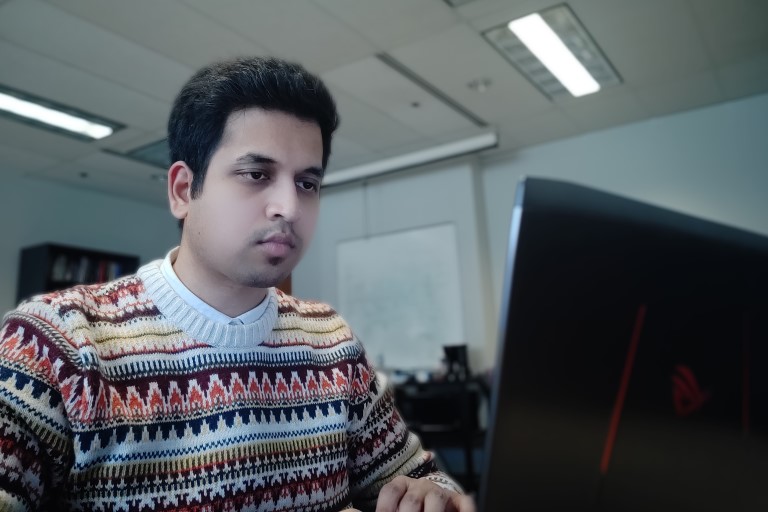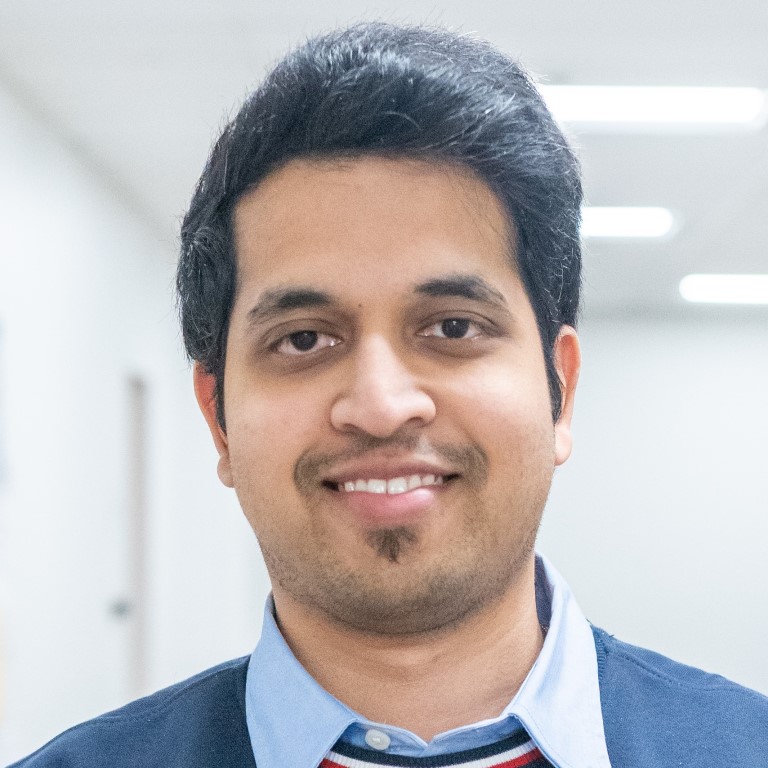Cyberattacks often make headlines around the world. As they grow in number and sophistication, their impacts on individuals and companies can be profound.
To understand today’s cyber threats, IUPUI students are seeking collaborative cybersecurity degrees, participating in impactful research and working with real-world clients to provide cybersecurity support. Through these experiences, students are leaving IUPUI well-prepared to join the country’s growing cybersecurity workforce.
We checked in with two cybersecurity students to learn about their experiences at IUPUI. Jessica Malejcikova is pursuing a BS/MS in Cybersecurity and Trusted Systems and is studying Computer Information Technology with a concentration in Information Security. Agnideven Palanisamy Sundar is a PhD student who is focusing on cybersecurity attacks in federated learning systems.
Why did you choose to study cybersecurity?
Malejcikova: I have always been interested in computers, but the topic of cybersecurity became even more pressing to me as I watched my family and friends struggle with maintaining their safety in a world that has rapidly grown to advocate for the implementation of computing technologies in almost every aspect of modern life. Over time, I realized that by learning more about cybersecurity, I could protect those I cared about and others that may not have as much experience with modern technologies.
Sundar: Since high school, I've been interested in networking and cryptography. While exploring these interests, I realized that cybersecurity’s impact was far more profound than I had initially thought. As the number of “Internet of Things” and “smart” devices increased, I recognized that this would lead to many new security issues that I couldn't completely comprehend. I felt it would be best to study cybersecurity to extend my knowledge and learn how to implement my ideas into security.
What role does cybersecurity play in today’s world?
Malejcikova: Cybersecurity is constantly growing in importance as more and more everyday activities become reliant on the internet and technology. This increase in the use of technology causes sensitive and personal data to be created through the everyday use of the internet, which then emphasizes the need to protect this data in a world that has become digital.
Sundar: With the rapid growth in the Internet of Things and artificial intelligence, there will be a time when everything "electronic" is connected to the web. Even traditionally non-electronic things are now linked to the internet. This ever-growing digital world makes cybersecurity all the more crucial, and companies have started realizing that. Many new and emerging startups have started budgeting cybersecurity in their initial plans, and some institutions even offer cybersecurity insurance. It has transitioned from being a requirement solely for financial institutions and social media sites into a multi-domain and multi-disciplinary necessity.
What cybersecurity research and hands-on experiences have you engaged in at IUPUI?
Malejcikova: Though my hands-on experience is limited because I am still working towards my degree, I am serving as the president of IUPUI’s Cybersecurity Club and participate with the Living Lab at IUPUI. During this internship, I have been working to conduct risk-assessment for a company that has taken interest in improving the security of their cyber-related systems. To help this company, I often implement many stages of penetration testing, where I attempt to find vulnerabilities in their system, and then I propose possible solutions to fix any problems found during testing. The overall goal of this internship is to help protect this company, its employees and its customers from being the target of newer forms of cyber threats.
Sundar: I am currently working on methods to prevent backdoor attacks on federated learning, a technique used by Google Assistant and Apple’s Siri to ensure user privacy and a faster response time. We know that companies collect client data and use it for training their machine learning model for many applications, including next-word prediction in keyboards. But directly collecting the client data leads to huge communication overheads and privacy issues. Federated learning allows the clients to train a local model with their own private dataset. These local models are then sent to the company's global server, where it is combined to form the global model, which is then shared with the clients. Unfortunately, in federated learning, the global server cannot verify the authenticity of the client's local models, which allows attackers to send infected local models to the server. My work focuses on defending the global model against these backdoor attacks.
How do you plan to use your cybersecurity degree in the future?
Malejcikova: In the future, I eventually hope to find a career protecting a large company from the dangers that continue to rise every day in the field of cybersecurity, but I plan to start off by working with smaller companies to gain hands-on experience. My hope is that a variety of hands-on experiences may help me find a future job in the area that I enjoy the most. My time at IUPUI has prepared me for this by teaching me the fundamental concepts and procedures that I will need to begin protecting companies in the cyber world, as well as by allowing me to experiment with these concepts through labs, the Cybersecurity Club and through my internship.
Sundar: Later on, I plan to go for an academic position, but first, I want to gain some industry experience. Machine learning and AI are widely being adopted into every field, and more often than not, the dataset used for the process contains private and highly sensitive information. It is essential to ensure that the data is protected and that the model functions as intended. My time at IUPUI has given me the opportunity to learn, explore and attain the practical knowledge needed to tackle all such security threats. My professors have taught me how to assess the risks and follow the proper protocol to assert maximum security. I believe that all the skills I've developed at IUPUI will be vital in the industry setup.
What advice do you have for others interested in studying cybersecurity?
Malejcikova: The best advice I could give to others planning to study cybersecurity is to learn good time management, don’t be afraid to make mistakes and that practice makes perfect. Good time management skills will help you to not fall behind on your assignments and projects, while practicing and not giving up are essential to learning many concepts in cybersecurity, which can be difficult to immediately grasp for most people. Always keep your head up and try your best!
Sundar: Cybersecurity is a fascinating discipline affirming its necessity in multiple fields. Similarly, cyber threats also go further beyond just "hacking" and "ransomware" attacks. My advice would be for people to have an open mind and understand how the threats differ from domain to domain. Studying cybersecurity provides a different perspective and teaches how to tackle various issues. I would suggest others to approach every aspect of cybersecurity with equal importance rather than just focusing on famous threats. After all, a system is only as secure as its weakest link.




